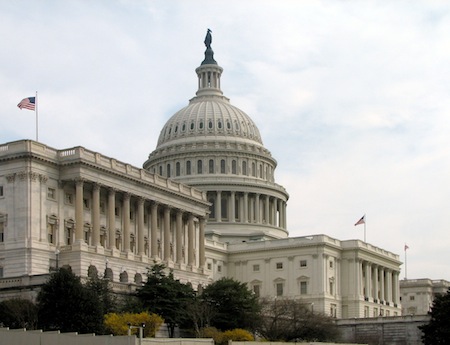Reps. Compromise on Net Neutrality Transparency Waiver

The smarter way to stay on top of broadcasting and cable industry. Sign up below
You are now subscribed
Your newsletter sign-up was successful
The House Energy & Commerce Committee has reached a compromise on a bill to make somewhat more permanent the FCC's temporary exemption for smaller cable ops from enhanced transparency rules under the FCC's new Open Internet order.
According to a bipartisan amendment to the bill that is scheduled to be considered at a markup starting later today in the full committee, the definition of small business is now 250,000 subs (the FCC exemption applied to systems with 100,000 and fewer) and the exemption sunsets after five years. The FCC is also directed to report to the Committee, and the Senate Commerce Committee, which also has principal jurisdiction over the FCC, within six months of enactment its recommendations for whether the exemption should be permanent and whether that 250,000 figure should be adjusted.
The amendment was co-sponsored by Republican Communications Subcommittee Chairman Greg Walden (Ore.) and Democrat Dave Loebsack (Iowa).
Republicans had wanted a permanent waiver and Democrats a term-limited one. Democrats won that one, though with the report caveat. The sub count was also closer to the Democrats opening bids (see below), so chairman Walden was true to his word that he was searching for common ground and compromise and thought it could be achieved.
That FCC recently extended the exemption for a year and put off a decision about making it permanent while it collected more info on the impact of the enhanced transparency requirements on small businesses, but Congress doesn't want to wait that long.
The Communications Subcommittee two weeks ago passed a version of the bill that would have defined small businesses as 500,000 subs or fewer and included a 1,500-employees-and-below figure as a trigger for the exemption. There was also no sunset. Smaller cable operators and Republicans backed that version, which passed out of the subcommittee, but without bipartisan support.
At that time, Loebsack offered, then withdrawn, an amendment that would have sunset the waiver after five years and set the cut-off at 100,000, and another amendment, never offered, with a five-year sunset and a 200,000-sub cut-off.
The smarter way to stay on top of broadcasting and cable industry. Sign up below
Also at the time, Communications Subcommittee Chairman Greg Walden (R-Ore.) signaled a compromise could be reached by the time the full committee took up the bill--a markup of the revised version is scheduled for tomorrow (Feb. 25), with opening statements Wednesday (Feb. 24).
Full Committee Chairman Fred Upton (R-Mich.) said the enhanced transparency requirments were burdensome and that the bill would allow small businesses to serve consumers rather than deal with red tape.
"I’m so pleased we’ve reached a compromise on H.R. 4596, the Small Business Broadband Deployment Act," said Communications Subcommittee ranking member Anna Eshoo (D-Calif.). "An informal survey of associations representing small broadband providers suggested that an exemption of the FCC’s enhanced transparency rules for companies with 250,000 or fewer subscribers would adequately address the vast majority of their memberships.
“The bipartisan amendment offered by Chairman Walden and Rep. Loebsack reflects this data by protecting the nation’s smallest ISPs while continuing to ensure that the majority of consumers receive the full set of benefits promised by the enhanced transparency rules. Importantly, broadband providers of all sizes will continue to be responsible for following the FCC’s bright line rules against blocking, throttling and paid prioritization, as well as the transparency rules adopted by the FCC in 2010. For these reasons, I urge Members to support the Walden-Loebsack amendment and pass H.R. 4596 as amended.”
The American Cable Association, which had pushed for congress to step in, preferably with a permanent extension, was nonetheless pleased with the long-term waiver, with ACA President Matt Polka calling it a "win-win-win -- for ISPs, their customers, and content providers."
"ACA had argued to the FCC that applying the enhanced transparency requirements to smaller ISPs provided no real benefit to their customers yet at the same time subjected these ISPs to substantial burdens," said Polka. "ACA was heartened when the FCC first adopted and then extended the temporary exemption for smaller ISPs, but, at the end of the day, smaller ISPs, which already need to comply with existing transparency rules and other onerous Open Internet requirements, need the certainty that only a long-term exemption can provide. They can then use their scarce resources to invest in their networks and provide innovative, advanced services to their subscribers."
Contributing editor John Eggerton has been an editor and/or writer on media regulation, legislation and policy for over four decades, including covering the FCC, FTC, Congress, the major media trade associations, and the federal courts. In addition to Multichannel News and Broadcasting + Cable, his work has appeared in Radio World, TV Technology, TV Fax, This Week in Consumer Electronics, Variety and the Encyclopedia Britannica.

